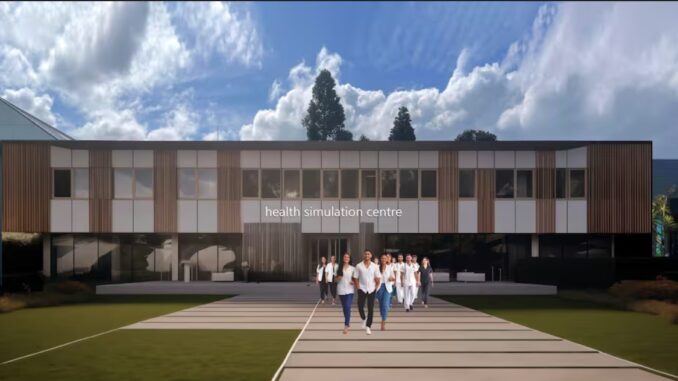
A $200 million tertiary knowledge, education, and arts hub, the first of its kind in New Zealand, is developing in Whangārei, with expectations it could deliver significant benefits for the area.
The proposed hub will center on the old Whangārei District Council Forum North base, which has seen limited use since the council left the premises for its new civic center in 2023.
In August, the council and the University of Auckland entered into a memorandum of understanding. Te Pūkenga likewise possesses a comparable agreement. Conversations with additional providers are in progress.
The KEA hub, focused on knowledge, education, and the arts, may rise to five stories and encompass an area equivalent to a rugby field in the city’s southwest.
Whangārei Mayor Vince Cocurullo stated that the new hub represented a significant advancement for Te Tai Tokerau.
“This is not merely another initiative – it is a foundation for the future of our area.” “It’s about investing in individuals, enhancing our industries, and transforming Whangārei into a location where talent flourishes and opportunities are plentiful,” Cocurullo stated.
The KEA hub will unify education, vocational training, and creative pursuits in a single location. It’s an initiative aimed at uplifting our area and providing individuals with the resources necessary to thrive in their own community.
Supporters claim it will dramatically transform the appearance and ambiance of Whangārei’s city center by drawing hundreds of university students to the area.
The hub, currently in its initial planning phase, may be fully functional by 2036.
A health simulator and education center is set to be the inaugural facility in the new knowledge, education and arts (KEA) hub, expected to be completed in 2026.
The project secured $250,000 in initial funding from the Transpower fund established for Northland after a pylon collapsed, disrupting power in the area.
The KEA hub initiative has received support from local government leaders in Te Tai Tokerau via the Northland Mayoral Forum, chaired by Mayor Cocurullo.
Cocurullo stated that the hub acknowledged the prediction that Whangārei and Northland’s population would increase to approximately 400,000 people over the next 30 years.
The Whangārei District Council had previously allocated $10 million of ratepayers’ funds for the repairs and renovations of Forum North.
Cocurullo stated that the central government might be engaged in the project alongside other operators.
The new center would accommodate between 2000 and 3000 students simultaneously at the KEA hub in Whangārei, along with its surrounding campuses in Kaitāia, Kerikeri, Ngāwha, and Dargaville.
The University of Auckland serves as the central linchpin of the hub project.
Vice-chancellor Professor Dawn Freshwater termed the upcoming projects as inventive.
“We are enthusiastic about the possibilities of the suggested knowledge precinct and the educational opportunities it will provide for the city and surrounding area,” Freshwater stated.
The KEA hub will consolidate the higher education infrastructure and services essential for various educators to utilize.
This may encompass various elements of the University of Auckland’s faculty of medical and health sciences, especially in medical, nursing, pharmacy, and optometry programs that are presently available at its Alexander Street Whangarei campus, the clinical campus of Whangārei hospital, and involve collaboration with GP clinics.
The university’s teacher education program, which has also been based at the same Alexander Street campus, is also believed to be included in KEA hub initiatives.
The chairman of the KEA hub project steering board, Graeme Kerr, mentioned that the hub had garnered significant interest from Northland and other areas, including central government.
Enhanced higher education pathways were crucial for uplifting the region and its economic well-being.
Kerr stated that nearly 60% of the 2250 school leavers from Northland in 2022 did not pursue any tertiary education, or enrolled in tertiary courses that did not enhance their earning potential beyond the initial two years post-study or training.
He stated that only 350 students who finished school that year attended university.
Kerr mentioned that the updated model would offer local options through campuses in Katāia, Kerikeri, Ngāhwa, and Dargaville that could connect to the Whangārei KEA campus and/or university.
The plan also includes a student housing facility with 300 beds.
Kerr mentioned that he had been collaborating closely with Harry Burkhardt, the chair of Te Kahu o Taonui (Northland Iwi Chairs Forum), on the project.
The hub will be crafted to accommodate a variety of operators who can utilize the amenities it offers.
Local Democracy Reporting Northland notes that the tertiary education currently provided by Te Pukenga’s NorthTec campus is likely to be moved to the KEA hub.
Te Pūkenga and NorthTec have each been reached out to for their input.
It is believed that the Northland Regional Council has shown support, with its Whangārei headquarters situated near Forum North.
Cocurullo mentioned that efforts for the new hub are presently in an initial phase. Possible operators were examining costs and conducting due diligence prior to the project’s upcoming steps.
The university aims to finalize due diligence by February, prior to deciding on the project.
Cocurullo mentioned that efforts are presently underway to assess what actions are required for certain sections of Forum North in relation to the new hub, encompassing cost estimates for renovation as opposed to demolition.
Whangārei’s planned new lyric theatre, costing over $45 million, is an essential component of the new center that will function alongside the existing Capitaine Bougainville theatre and exhibition hall.
Whangārei District Council has allocated $6.3 million from ratepayers’ funds for the theatre’s initial funding. So far, the trust has allocated $2.5 million for the expenses of the theatre.
Forum North Trust chairperson Lachie McLean stated that his organization was thrilled by the university’s interest in the lyric theatre.
McLean stated that his group had been advocating for a new theatre for four decades.
Forum North was constructed in 1981, and its Capitaine Bougainville theatre was the tiniest of its kind in a New Zealand provincial city, created merely as a temporary solution to take the place of the city’s 700-seat Old Town Hall theatre.

Leave a Reply